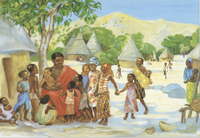What does this mean?
If you've ever been through confirmation you may recognize this question for it is the central question of Luther's Small Catechism. After each commandment, each petition of the Lord's Prayer, each article of the Creed, and in study of the Sacraments of Baptism and Holy Communion, he famously asks (by means of teaching) "What does this mean?"
Which happens to be the mystery for me this week. Our texts from Jeremiah, James, and Mark are a strange set of texts with a prophecy about the death of Jeremiah (which we interpret as a prophecy of Jesus' own death), an exhortation to be wise and peaceful from James, and Jesus teaching that the greatest in the kingdom is a servant of all and one who welcomes a little child in the name of Jesus welcomes the Triune God.
What does it mean that Jesus' teaching about welcoming children comes directly after he talks about suffering, death, and being last of all and a servant of all? In thinking of the implications I begin to get a little queasy. I don't think this is just a kind of welcome that says on the church marquis, "All are welcome!" I don't think this is the kind of welcome that greets a new face and says, "Glad you are here today."
 |
| JESUS MAFA. Jesus welcomes the children, from Art in the Christian Tradition, a project of the Vanderbilt Divinity Library, Nashville, TN. |
But in Jesus' time children were not viewed this way. Children were little more than property, valued only for their ability to produce, work, or earn income in any other way. Children, in our reading from Mark, represent the least, the last, and the oppressed. Welcoming children, then, was one of the ways Jesus became the least of all and servant of all.
So if it's not really about welcoming children in worship or church today, what does this mean? Well, I think we can begin by asking ourselves who the least, the last, and the oppressed in our society are. Then comes the hard part of asking ourselves what does it mean to welcome these people? And I'm not just talking welcoming people to worship on Sundays or Wednesdays. What does it mean to welcome these people into your lives every day?
We like to be great, to honor those who succeed, to scorn those who fail, to play up our strengths, to hide our weaknesses. Welcoming the least, the last, and the oppressed goes against everything our society holds dear. Which is why, I think, our James text talks about the wisdom from above. "Wisdom from above first pure, then peaceable, gentle, willing to yield, full of mercy and good fruits, without a trace of partiality or hypocrisy."
This is the kind of servant wisdom Jesus asks of his disciples. This is the kind of radical welcome that God encourages. This is the kind of least-is-greatest attitude that the Spirit stirs up in us. This is the kind of lesson that makes us ask of ourselves and of our communities: what does this mean?

No comments:
Post a Comment